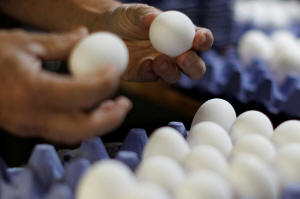Laid-off: Former Tyson Foods chicken farmers face high costs switching
to eggs
 Send a link to a friend
Send a link to a friend
 [April 30, 2024] By
Tom Polansek [April 30, 2024] By
Tom Polansek
CHICAGO (Reuters) - Some U.S. farmers who once raised chickens for Tyson
Foods to slaughter are shifting to sell eggs instead after the
meatpacker closed six plants, a move that left local suppliers with
limited options for work.
In one example, former Tyson suppliers in central Virginia formed a
cooperative that will produce cage-free eggs for Indiana-based Dutch
Country Organics on a dozen farms, after Tyson closed its nearby Glen
Allen plant last year.
In Dexter, Missouri, the world's biggest egg company, Cal-Maine Foods,
in March finalized a deal to buy another chicken meat plant Tyson
shuttered. Cal-Maine recruited local farmers to produce eggs.
The switch to eggs, which carries high costs, reflects the tough choices
former Tyson suppliers around the country must make following the
company's 2023 decision to shut plants in an effort to return to
profitability in its chicken business after misjudging consumer demand.
Egg farming also comes with risk as lethal bird flu infections have hit
laying hens harder than broiler chickens raised for meat. The virus
flared up for a third year this spring, resulting in the culling of
nearly 10 million hens involved in commercial egg production so far this
year. Cal-Maine culled about 1.9 million birds this month after an
outbreak in Texas.

MILLIONS TO UPGRADE
Former broiler growers must spend millions of dollars on barn and
equipment upgrades to produce eggs, a notoriously volatile market, 18
poultry producers, government officials and industry experts told
Reuters. Last year, egg prices tanked after reaching record highs due to
the worst-ever outbreak of bird flu in poultry.
"It's a very expensive investment from the grower," said John Bapties,
who is president of the Central Virginia Poultry Cooperative and raised
chickens for Tyson for 20 years before the Glen Allen plant closed.
His cooperative is placing hens in barns that formerly housed broiler
chickens, and expects to sell cage-free eggs produced by about one
million birds to Dutch County Organics within a year, he said.
Farmers needed to replace dirt floors in barns with concrete and install
nesting systems for hens, among other costly renovations.
Taylor Lee, a former Tyson grower in DeWitt, Virginia, said he decided
against the switch. He will focus on raising crops while keeping his
poultry barns empty for now.
"They're painting a pretty picture with that co-op but it's $2.8 million
roughly to upgrade my farm to egg production," Lee said.
Roger Reynolds, another Virginia farmer who supplied broiler chickens to
Tyson, said he is considering producing eggs for Braswell Family Farms.
His daughter found work there after Tyson's plant closure eliminated her
job.
Producing eggs means a different way of life, Reynolds said. For one
thing, hens lay most of their eggs in the morning, meaning farmers
cannot go to church on a Sunday without checking their barns first, he
said.
CAGE-FREE EGGS
The United States has about 125 million cage-free laying hens, about 40%
of total layers, U.S. government data show. More are needed after some
states banned sales of eggs from caged hens and restaurants committed to
cage-free supplies, Dutch Country Organics CEO Lamar Bontrager said.
[to top of second column] |

A worker sorts cage-free chicken eggs at Hilliker's Ranch Fresh Eggs
in Lakeside, California, U.S., April 19, 2022. Picture taken April
19, 2022. REUTERS/Mike Blake/File Photo

"I've been getting calls like crazy," Bontrager said. "Those guys
are all concerned of where to procure their eggs."
Dutch Country sells eggs to retailers including Walmart, Kroger and
Target, according to Virginia officials.
Former broiler growers offer egg companies an opportunity to expand
production because the farmers are already familiar with poultry.
"It's one of the ways that these companies are converting: by
grabbing old barns," said Brian Moscogiuri, global trade strategist
for Eggs Unlimited.
Tyson declined to comment. The company said last year that 55
broiler growers supplied the Glen Allen plant and that it offered
them buyout packages. The plant had about 700 employees.
Tyson has laid off corporate employees and said it will close an
Iowa pork plant, in addition to shutting chicken plants. Farmers
depended on the plants as markets for their livestock.
The meatpacker is slated to report quarterly results on Monday.
In Arkansas, the third biggest broiler-producing state, Tyson closed
two chicken plants. Some of its former growers found work supplying
other chicken companies, said Jared Garrett, Arkansas Farm Bureau's
director of commodity activities and economics.
"They lucked out," he said.
JOBS WANTED
Tyson closed chicken plants in Dexter and Noel, Missouri, with about
700 workers and 1,500 workers, respectively. Cal-Maine said it plans
to initially employ about 100 people at the Dexter plant.
"While I welcome Cal-Maine's investment in Dexter, it does not right
the wrongs of Tyson or guarantee new jobs for the more than 2,000
Missourians now out of one," U.S. Senator Josh Hawley of Missouri
said in a statement to Reuters.
David Wyman, Dexter's city administrator, also welcomed Cal-Maine,
though it is expected to work with a fraction of the farmers who
supplied Tyson. Cal-Maine said it expects to expand over time and
that revenue opportunities will be as good or better than farmers
had under previous contracts.
But some former Tyson suppliers are left with empty barns, Wyman
said: "They're really in bad shape."
Egg farming is generally harder to get into operationally than
raising chickens for meat; requires more capital and labor
expertise; and carries higher disease risks, said Wendong Zhang, an
assistant professor and agricultural economist at Cornell
University.
"Due to the closure of the plants and termination of contracts, the
switch is in a way a move of necessity," he said.
(Reporting by Tom Polansek; Editing by Caroline Stauffer and Anna
Driver)
[© 2024 Thomson Reuters. All rights
reserved.]
This material may not be published,
broadcast, rewritten or redistributed.
Thompson Reuters is solely responsible for this content.
 |